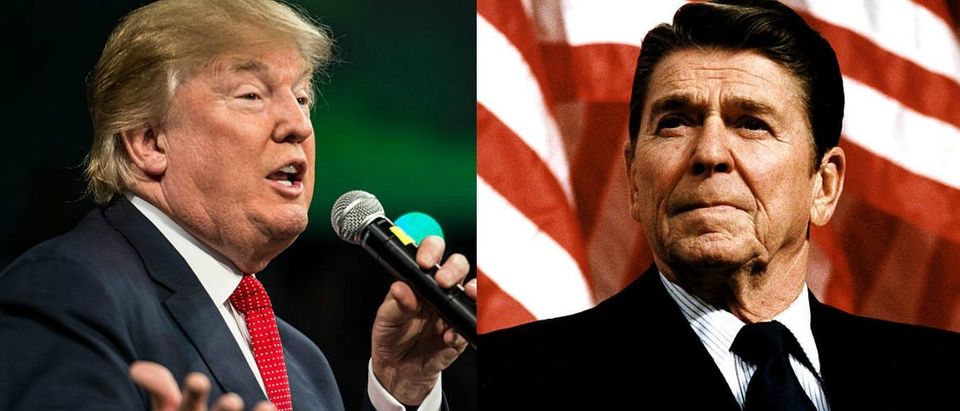Democrats are touting President Donald Trump’s latest approval numbers as evidence the American people view the new president as a failure. At just 37 percent, according to Gallup, Trump’s approval is the lowest of any modern president in the first 100 days of his administration.
Democrats would be wise to save the confetti, however, and remember that all presidents endure times of low approval. Even Ronald Reagan, now one of the most beloved presidents in our nation’s history, experienced downturns.
Trump has plenty of time to turn his numbers around, especially if he looks to Reagan’s leadership as an example on two key ways he can establish trust among the public: effective communication and demonstrable progress in thawing tense international relationships where it matters.
After reaching a high of 68 percent approval in the months following the 1981 assassination attempt, Reagan’s approval ratings took a turn midway through his first term. They hit their low of 35 percent in January 1982.
But Reagan went on to win reelection in a landslide less than two years later. His approval ratings remained strong throughout most of his second term, returning to the high 60s and even breaking 70 percent in January 1986.
How did he do it? By being The Great Communicator and by making real progress in thawing tense international relationships that had the country on edge.
Reagan is a case study in the principle that words matter. He — and those who helped to craft his speeches — understood the importance of expressing the right message in the right way, and he never missed a chance to remind the American people of the country’s past and potential.
The 40th anniversary of the D-Day invasion in June 1984 provided a suitable opportunity to do so. All of us were deeply touched by Reagan’s speech at Pointe du Hoc, for a moment forgetting about the horrors of 1983; the Soviets and the downing of KAL 007; Pershing II Missiles facing off with SS-20s; conflict over Star Wars, or the lowest point of the Reagan presidency, the loss of 241 brave Marines put in harms way and murdered by terrorists in Beirut in October 21, 1983.
Reagan’s communication skills also recognized the importance of the small things like word choice and alliteration that created memorable and important phrases. Reagan’s Point du Hoc speech spoke of “pride and purpose,” and of a nation willing to defend itself and its allies while always being “prepared for peace.” No thrill of a tweet there, but deep in meaning considering the context of the times.
Beyond powerful communication, Reagan’s poll rebound also aligned with early signs of a thaw in the Cold War tensions with the Soviet Union. The thaw began in 1984 with the death of Yuri Andropov, general secretary of the Communist Party of the Soviet Union.
After just 10 days in office, Andropov’s successor, Konstantin Chernenko, sent Reagan a letter warmer in tone than any of Andropov’s. Reagan noted in his diary March 1 of 1984 that he had a “gut feeling” that the time had come for a face-to-face meeting with his Soviet counterpart. The September 1984 visit by Soviet Minister of Foreign Affairs Andrei Gromyko signaled an end to the standoff, and though Americans saw Gromyko as “hard as granite,” Reagan knew the Soviets would come to the table after his landslide election. And they did.
Within eight months of taking office after Chernenko’s death in 1985, Mikhail Gorbachev would travel to Geneva to meet with Reagan. Understanding the importance of diplomacy, Reagan moderated his criticism of the Soviet Union in anticipation of the meeting. The winds of change were blowing.
On the eve of the Geneva summit, according to the Washington Post, Reagan stood near the peak of the personal popularity, enjoying some of the highest ratings of his presidency in handling relations with the Soviet Union and easing considerable fears that his military policies increased the chance of nuclear war.
To be like Reagan, Trump should be unwavering in his promotion of American principles, but committed to seizing opportunities to improve America’s important foreign relationships.
Trump would also be wise to consider the impact of his communications strategy and try to emulate Reagan’s style. Reagan consistently demonstrated strength, but wrapped it in optimism, humility and humor. He knew the American people would respond when he reminded them of this country’s great past, and its promising future.
John Heubusch is the executive director of the Ronald Reagan Presidential Foundation and Institute and author of the new novel, The Shroud Conspiracy.


